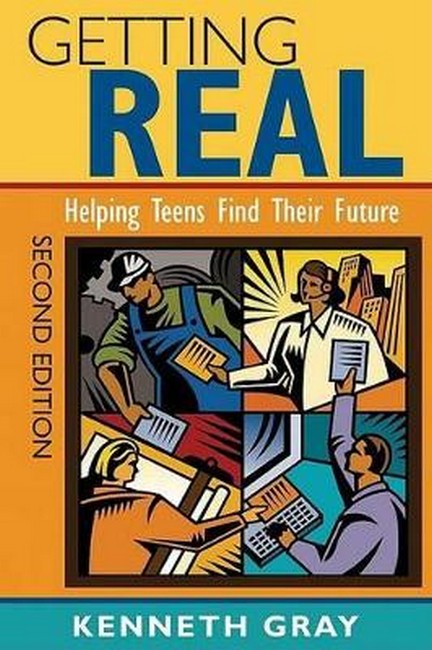Kenneth C. Gray is a professor in the Workforce Education and Development Program at Pennsylvania State University. Prior to joining the faculty at Penn State, he was superintendent of the Vocational Technical High School System in Connecticut and has been a high school English teacher, guidance counselor, and administrator. He has published widely and is frequently quoted in the national press. He is coauthor with Edwin Herr of Workforce Education: The Basic. His latest book, Getting Real: Helping Teens Find Their Future, addresses the importance of helping teenagers develop career direction as a prerequisite to postsecondary success. He holds a BA in economics from Colby College, an MA in counseling psychology from Syracuse University, and a doctorate in technical education from Virginia Tech.
Request Academic Copy
Please copy the ISBN for submitting review copy form
Description
Preface to the Second Edition Acknowledgments About the Author 1. Getting Real: New Realities for Postsecondary Success A New Goal: Postsecondary Success Career Direction and the "Fourth" R Career Maturity and Career Direction Career Exploration Activities and Career Maturity Career Development Programs: Are They Effective? Society's Ambivalence About Career Choice The Role of Public Schools Making the Case for Career Development Programs Promoting Success Part I. Understanding Those We Try to Help "Get Real" 2. Today's Teens and Their Parents Today's Teens Today's Parents Promoting Success 3. Dropouts, Teens With Disabilities, and Graduates Seeking Full Time Employment Getting Real and High School Dropouts Getting Real and Special Populations High School Graduates Who Seek Full Time Employment Promoting Success 4. Creating Opportunities by Countering Stereotypes Occupational Stereotypes Gender Stereotypes and Earnings: Education or Occupation? Occupational Stereotyping: Minorities and the Economically Disadvantaged Promoting Success Part II. Understanding Labor Market Fundamentals 5. Labor Market Misunderstandings and Bad Advice Misunderstanding 1: A University Degree Guarantees Access to High Wages Misunderstanding 2: A University Degree Guarantees Access to Professional Careers Misunderstanding 3: High Tech Careers Require a University Degree Misunderstanding 4: Career Planning Is Worthless Because People Change Jobs All the Time Anyway Misunderstanding 5: University Graduates Will Take All the Good Jobs Labor Market Advantage: The Secret to Getting High-Skill / High-Wage Employment Bad Advice Given to Teens Will Tentative Career Decisions Close the Door to Future Opportunity? Promoting Success 6. Occupational Projections, Technical and Middle Skill Employment I: Using Labor Market Information II: Occupational Projections III: The Other Way to Win: Technical and Middle-Skill Occupations A Selective List of Technical and Middle Skilled Occupations: This Is Rocket Science Promoting Success Part III. Strategies to Promote Career Direction 7. Career Success, Decision Making, and Teens The Path to Career Success? Characteristics of a Career Mature Teenager Career Decision Making Anxiety of Teens Reducing Teen Anxiety Over Making Career Decisions Promoting Success 8. Strategies to Promote Adolescent Career Maturity and Direction Student Outcome Goals for Career Development Program Outcome Goal 1: Promoting a Tentative Career Direction While in the 10th Grade Outcome Goal 2: Verifying Tentative Career Directions Outcome Goal 3: Develop a Postsecondary Plan Providing Career Counseling Promoting Success 9. Considering "All" the Alternatives Traditional Formal Education Alternatives Alternatives to College The "Bridge" or "Prep" Year Promoting Success 10. Six-Step Plan for Postsecondary Success Talking to Parents Parents and Career Choice Six-Step Plan for Postsecondary Success Helping Parents With Difficult Choices Promoting Success 11. Getting Real and the Role of the Business Community Community Organizations Promoting Success 12. How Are Teenagers Best Served, Nutritional Lies or Reality? Nutritional Lies Creating Opportunity Five Premises for Success Well-Intended but Bad Advice Given to Teens Understanding Our Role Fighting the Good Fight References Index
"I applaud the author's efforts in promoting a shift from the 'one way to win' stance toward that of helping students face reality and develop career goals that will help them be successful." -- Shawn Grime, School Counselor "Stresses the need for career maturity. This is one of the few books that addresses this topic so well." -- Diane Smith, School Counselor "This book is a must-read for those involved in developing futures planning for students in ninth grade through their exit from high school into adult life." -- Kelli S. Kercher, Transition Specialist "Gray provides a systematic method for working with students to look at opportunities after high school in a realistic way." -- Mary Reeve, Director

